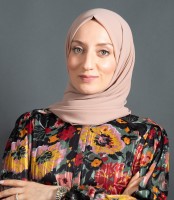
Dr Aala El-Khani develops and researches innovative ways to reach families that have experienced conflict with family skills support and training. She has conducted field research with families in refugee contexts and conflict zones, exploring their parenting challenges and the positive impact parenting support can provide to improve and child and caregiver wellbeing. Her work has significantly contributed to an agenda of producing materials, which together form psychological first aid for families affected by conflict and displacement. Aala is a Humanitarian Psychologist and works as a consultant for the United Nations Office on Drugs and Crime as well as an honorary Research Associate at the University of Manchester at the Division of Psychology and Mental Health. Her current work collaborates the efforts of UNODC and The University of Manchester in developing and evaluating family skills programmes in countries such as Afghanistan, Palestine, Serbia, Uzbekistan and Indonesia. Aala is passionate about highlighting the significant role that caregivers play in protecting their children during stress contexts. She has trained NGO workers, school teachers and affected families globally on family skills and research methods. Her two TEDx talks have been viewed over 1.4 million times.
Abstract body
Coronavirus disease (COVID-19) has changed family life and is associated with increased parenting stress and, in turn, an increased risk of harsh parenting increasing vulnerabilities around children. These vulnerabilities are predictors of risky behaviours and poor social and health outcomes. In response, the United Nations Office on Drugs and Crime(UNODC) adapted its family skills programming to include evidence-informed parenting tools to support caregivers during the pandemic and beyond stemming from its cumulated experience in supporting parenting under stressful situations. These tools (leaflets and booklets) are available in over 46 languages and include key parenting messages, in parallel to messages on complying with COVID-19 health response measures. These are being implemented globally. Qualitative and quantitative data collected from UNODC network of field offices, reflected that dissemination and scalability of these tools has proven feasible with indication of promising effectiveness. Current efforts are underway adapting the further dissemination of these tools, including via digitalization and video recordings.
UNODC also joined partner agencies under the INSPIRE initiative to end violence against children and availed further parenting tools. It is essential that a family systems approach is integrated into a COVID-19 response to mitigate negative effects of COVID-19 on family life and youth protectory.
Learning objectives
Highlight the key role of caregivers to promote the well-being and mental health of children and youth during COVID-19.
